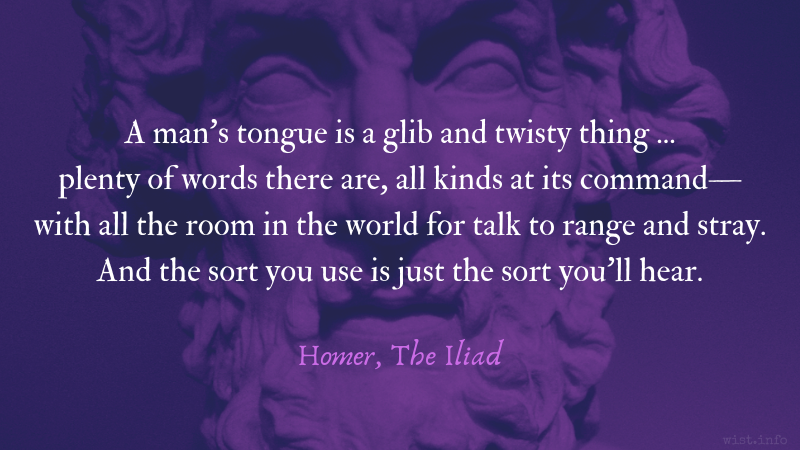That is not good language which all understand not.
George Herbert (1593-1633) Welsh priest, orator, poet.
Jacula Prudentum, or Outlandish Proverbs, Sentences, &c. (compiler), # 302 (1640 ed.)
(Source)
Quotations about:
vocabulary
Note not all quotations have been tagged, so Search may find additional quotes on this topic.
To be enlightened: a big phrase! Certain men think themselves enlightened because they are decided: thus taking conviction for truth, and strong conception for intelligence. There are others who, because they know all the words, think they know all the truths.
[Être éclairé, c’est un grand mot! Il y a certains hommes qui se croient éclairés, parce qu’ils sont décidés, prenant ainsi la conviction pour la vérité, et la forte conception pour l’intelligence. Il en est d’autres qui, parce qu’ils savent tous les mots, croient savoir toutes les vérités.]Joseph Joubert (1754-1824) French moralist, philosopher, essayist, poet
Pensées [Thoughts], ch. 4 “De la Nature des Esprits [On the Nature of Minds],” ¶ 36 (1850 ed.) [tr. Calvert (1866), ch. 5]
(Source)
(Source (French)). Alternate translations:
Enlightenment -- a great word! Some men think themselves enlightened, because they are decided, taking conviction for truth, and strong conception for intelligence. Others, because they know all that can be said think that they know all truth.
[tr. Lyttelton (1899), ch. 3, ¶ 15]
Enlightenment is a fine word! Some men fancy themselves enlightened because they are decisive, thus taking conviction for truth, and force of conception for intelligence. Others think that because they have every word at their command, they have every truth also.
[tr. Collins (1928), ch. 4]
Because they know all the words, they think they know all the truths.
[tr. Auster (1983)], 1819 entry]
All ways of expressing ourselves are good if they make us understood. Thus, if the clarity of our thoughts comes through better in a play of words, then the wordplay is good.
Joseph Joubert (1754-1824) French moralist, philosopher, essayist, poet
Pensées [Thoughts], 1805 (1850 ed.) [tr. Auster (1983)]
(Source)
Analog not found in standard translations of the Pensees.
And yet if there’s one thing consistent about language it is that it is constantly changing. The only languages that do not change are those whose speakers are dead.
Rosalie Maggio (1944-2021) American writer
Unspinning the Spin: The Women’s Media Center Guide to Fair and Accurate Language, “Writing Guidelines / Introduction” (2014)
(Source)
This is sometimes attributed to Maggio's earlier The Bias-Free Word Finder (1992), but only the first sentence is present in that version.
The source link is to the web page that the WMC set up for the book.
French food, by the way, isn’t fancy unless, like other cooking, it wants to be fancy; perhaps it sounds so because it is in a foreign language, but a Coq au Vin is a chicken stew, a Pot-au-feu is a boiled dinner, a Mayonnaise de Volaille is a chicken salad, Soubise is plain old rice cooked with onions, and there is nothing fancy about any of them.
Julia Child (1912-2004) American chef and writer
Julia Child’s Kitchen, Introduction (1975)
(Source)
Don’t use the vulgaria’s patois. “Swell,” “Gent,” “Shine” and “Cop” are among his most common expressions.
Minna Antrim (1861-1950) American epigrammatist, writer
Don’ts for Bachelors and Old Maids (1908)
(Source)
Now and in the time to be, I think it will pay for you to zero in on being precise with your language. Try to build and treat your vocabulary the way you are to treat your checking account. Pay every attention to it and try to increase your earnings. The purpose here is not to boost your bedroom eloquence or your professional success — although those, too, can be consequences — nor is it to turn you into parlor sophisticates. The purpose is to enable you to articulate yourselves as fully and precisely as possible; in a word, the purpose is your balance.
Joseph Brodsky (1940-1996) Russian-American poet, essayist, Nobel laureate, US Poet Laureate [Iosif Aleksandrovič Brodskij]
“Speech at the Stadium,” Commencement Address, University of Michigan (18 Dec 1988)
(Source)
Broadly speaking, short words are best, and the old words, when short, are the best of all.
Winston Churchill (1874-1965) British statesman and author
The Times Literary Award luncheon, London (2 Nov 1949)
(Source)
A man’s tongue is a glib and twisty thing …
plenty of words there are, all kinds at its command —
with all the room in the world for talk to range and stray.
And the sort you use is just the sort you’ll hear.[Στρεπτὴ δὲ γλῶσσ᾽ ἐστὶ βροτῶν, πολέες δ᾽ ἔνι μῦθοι
παντοῖοι, ἐπέων δὲ πολὺς νομὸς ἔνθα καὶ ἔνθα.
ὁπποῖόν κ᾽ εἴπῃσθα ἔπος, τοῖόν κ᾽ ἐπακούσαις.]Homer (fl. 7th-8th C. BC) Greek author
The Iliad [Ἰλιάς], Book 20, l. 248ff (20.248) [Aeneas] (c. 750 BC) [tr. Fagles (1990), l. 287ff]
(Source)
Original Greek. Alternate translations:
A man’s tongue is voluble, and pours
Words out of all sorts ev’ry way. Such as you speak you hear.
[tr. Chapman (1611), ll. 228-29]
Armed or with truth or falsehood, right or wrong,
So voluble a weapon is the tongue;
Wounded, we wound; and neither side can fail,
For every man has equal strength to rail.
[tr. Pope (1715-20)]
The tongue of man is voluble, hath words
For every theme, nor wants wide field and long,
And as he speaks so shall he hear again.
[tr. Cowper (1791), ll. 309-11]
The language of mortals is voluble, and the discourses in it numerous and varied: and vast is the distribution of words here and there. Whatsoever word thou mayest speak, such also wilt thou hear.
[tr. Buckley (1860)]
For glibly runs the tongue, and can at will
Give utt’rance to discourse in ev’ry vein;
Wide is the range of language; and such words
As one may speak, another may return.
[tr. Derby (1864)]
Glib is the tongue of man, and many words are therein of every kind, and wide is the range of his speech hither and thither. Whatsoever word thou speak, such wilt thou hear in answer.
[tr. Leaf/Lang/Myers (1891)]
The tongue can run all whithers and talk all wise; it can go here and there, and as a man says, so shall he be gainsaid.
[tr. Butler (1898)]
Glib is the tongue of mortals, and words there be therein many and manifold, and of speech the range is wide on this side and on that. Whatsoever word thou speakest, such shalt thou also hear.
[tr. Murray (1924)]
The tongue of man is a twisty thing, there are plenty of words there
of every kind, the range of words is wide, and their variance.
The sort of thing you say is the thing that will be said to you.
[tr. Lattimore (1951)]
Men have twisty tongues, and on them speech of all kinds; wide is the grazing land of words, both east and west. The manner of speech you use, the same you are apt to hear.
[tr. Fitzgerald (1974)]
Pliant and glib is the tongue men have, and the speeches in it are many and various -- far do the words range hither and thither; such as the word you speak is the word which you will be hearing.
[tr. Merrill (2007)]
A scrupulous writer, in every sentence that he writes, will ask himself at least four questions, thus: What am I trying to say? What words will express it? What image or idiom will make it clearer? Is this image fresh enough to have an effect? And he will probably ask himself two more: Could I put it more shortly? Have I said anything that is avoidably ugly?
But you are not obliged to go to all this trouble. You can shirk it by simply throwing your mind open and letting the ready-made phrases come crowding in. The will construct your sentences for you — even think your thoughts for you, to a certain extent — and at need they will perform the important service of partially concealing your meaning even from yourself.
It is at this point that the special connection between politics and the debasement of language becomes clear.
George Orwell (1903-1950) English writer [pseud. of Eric Arthur Blair]
“Politics and the English Language,” Horizon (Apr 1946)
(Source)
The problem with defending the purity of the English language is that English is about as pure as a cribhouse whore. We don’t just borrow words; on occasion, English has pursued other languages down alleyways to beat them unconscious and riffle their pockets for new vocabulary.
James Nicoll (b. 1961) Canadian reviewer, editor
“The King’s English,” rec.arts.sf-lovers (15 May 1990)
(Source)
Nicoll later corrected the final verb to "rifle."
Do keep a thesaurus, but in the shed at the back of the garden or behind the fridge, somewhere that demands travel or effort. Chances are the words that come into your head will do fine, e.g., “horse”, “ran”, “said”.
Roddy Doyle (b. 1958) Irish novelist, dramatist, screenwriter
In “Ten Rules for Writing Fiction,” The Guardian (20 Feb 2010)
(Source)
“Rabbit,” said Pooh to himself. “I like talking to Rabbit. He talks about sensible things. He doesn’t use long, difficult words, like Owl. He uses short, easy words, like ‘What about lunch?’ and ‘Help yourself, Pooh.'”
A. A. Milne (1882-1956) English poet and playwright [Alan Alexander Milne]
House at Pooh Corner, ch. 4 “Tiggers Don’t Climb Trees” (1928)
(Source)














